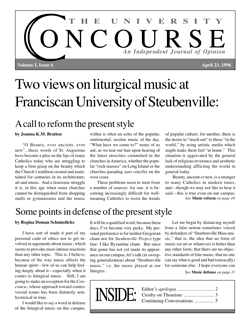Democracy
by Kevin Schmiesing
To begin, I want to add my voice to those praising this journal and the forum it provides for legitimate points of debate concerning the University and larger issues of Catholic intellectual life. Well done!
In addition, I wish to respond more specifically to the cover article of the April 10 issue: “Democracy: the voice of God or the madness of the mob?” My short answer to this question is that democracy (in the United States) is neither, but I get the impression that the author tends too much to the latter position. Ms. Bratten brings to light many important objections to “that set of notions” which comprise the “democratic ideal,” and it is important to maintain such a critical attitude toward an institutional ideal that has been heralded so uncritically by Americans of every sort since this nation’s beginnings.
The mediocrity fostered by a wrong-headed passion for “equality” is a real problem—one Tocqueville recognized long ago: “When I survey this countless multitude of beings, shaped in each other’s likeness, amidst whom nothing rises and nothing falls, the sight of such universal uniformity saddens and chills me…” More recently, George Kennan, author of the policy of “containment” and one of the most influential American diplomats of the 20th century, has also bemoaned the effect of public opinion and electioneering on the making of American foreign policy, citing these as the root cause of foreign relations blunders. The alternatives to relying on popular opinion, however, are highly problematic—to a degree Ms. Bratten fails to appreciate. There, in fact, have been various sorts of aristocracies in this country, from the Puritan ministers of the 17th century to the deistic founding fathers of the 18th century to the liberal Christian reformers in the 19th century to secular academics and politicians of the 20th century. Each of these groups believed that they were the most educated and virtuous of all Americans and sought in various ways to impart their wisdom to the rest of society, often with results not wholly beneficial from the perspective of Catholic sensibility.
To put my point more succinctly, and to spare readers endless examples, I believe that a study of American history reveals that often Ms. Bratten’s patronized “common man,” has proved wiser than his allegedly more “educated and far-sighted” counterparts. Tocqueville and Kennan, in the end, admitted the benefits of democracy outweigh its detriments; both in 1840 and 1950, these observers agreed that democracy in America was superior to any other form of government with which they were familiar. Ms. Bratten admits that democracy may be “the most practicable structure for a particular time and people,” and here we are agreed.
I think it is helpful to consider democracy as a principle of government as distinguished from democracy as a philosophy of life, ala John Dewey. Ms. Bratten’s failure to make this distinction may be the source of our disagreement. Indeed, I wholeheartedly reject the kind of democratic philosophy that posits the equality of ideas as a corollary of the equality of men. I further agree that equality doesn’t entail an admission of equal ability, virtue or wisdom. But I want to warn against a sanguine eagerness to advocate the accumulation of power into the hands of a few, when there is no guarantee that these few will be truly wise and virtuous according to the standards of objective truth.
Ms. Bratten looks to Nietzsche for an answer to this problem, and she is right to dub this the “most unlikely of places.” Nietzsche did, to be sure, reject the democratic ideal, but his solution was hardly inspired by Christian virtue. To counter the levelling tendency of modern society, the troubled German philosopher argued for the dominance of the “strong.” For Nietzsche, however, the “strong” were those capable of exerting their will against all opposition. To quote from the text cited by Ms. Bratten, The Genealogy of Morals: “To sacrifice humanity as mass to the welfare of a single stronger human species would indeed constitute progress…”
Ms. Bratten has pointed out aptly the dangers of a democratic philosophy of life; Nietzsche’s willingness to sacrifice the weak in deference to the strong starkly displays the dangers of an aristocratic philosophy of life.
Kevin E. Schmiesing, Class of ‘94
Kevin Schmiesing, beloved brother of Design Editor David Schmiesing, is pursuing a PhD in history at the University of Pennslyvania. He and Anne Lodzinski (senior, theology major) are to be married May 18 in Sidney, OH. Prayers and best wishes for them both!


